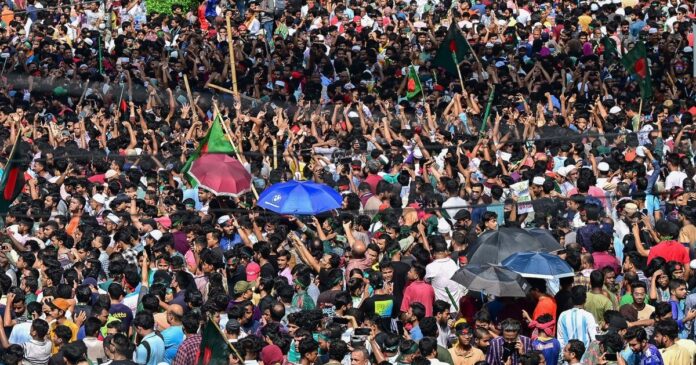According to key organisers of the student protests in Bangladesh, Nobel Peace Prize winner Muhammad Yunus has been suggested to lead an interim government following the resignation and departure of longtime Prime Minister Sheikh Hasina.
Nahid Islam, a sociology student who played a significant role in the protests against government job quotas that escalated into a nationwide movement against the administration, announced in a social media video that Yunus had agreed to assume the leadership position.
“We are eager for the process to begin in the morning,” Islam stated on Monday night. “We urge the president to swiftly establish an interim government with Dr. Yunus at the helm.”
It was reported that the protest organisers were set to meet with army officials on Tuesday, although Islam made it clear that the students would not support a government led by the military.
Yunus, renowned for his microlending initiatives and often referred to as the “banker to the poor,” faced corruption allegations in Bangladesh during Hasina’s term but maintained that the charges were politically motivated.
A representative for Yunus confirmed that he had accepted the students’ request to serve as an advisor to the interim government and would soon return to Bangladesh after a medical procedure in Paris.
Reporting from Dhaka, Al Jazeera’s Tanvir Chowdhury mentioned that the situation in the capital seemed to have calmed down on Tuesday as the Students Against Discrimination movement called for peace despite underlying tensions.
The movement planned to propose additional names on Tuesday morning, emphasizing that their primary demand was non-negotiable. Chowdhury warned that unless those names were accepted, the students might resume their protests.
After the removal of Hasina on Monday, army chief General Waker-Uz-Zaman announced that he was assuming temporary leadership as soldiers attempted to quell the escalating unrest in the country.
He assured that an interim government would govern Bangladesh and pledged to investigate the numerous deaths that occurred since mid-July. “Have faith in the military. We will investigate all the killings and hold the responsible accountable,” he stated.
President Mohammed Shahabuddin stated that the interim government would swiftly organize new elections, emphasizing that the decision was unanimous. He also declared the immediate release of opposition leader Begum Khaleda Zia, who had been convicted of corruption in 2018.
United Nations’ human rights chief, Volker Turk, emphasized that the transition of power in Bangladesh must comply with international obligations and involve meaningful participation of all citizens.






